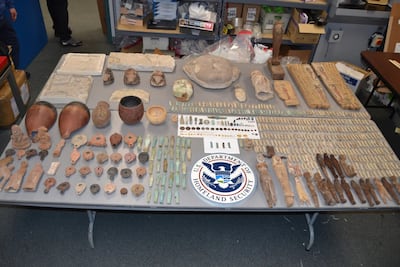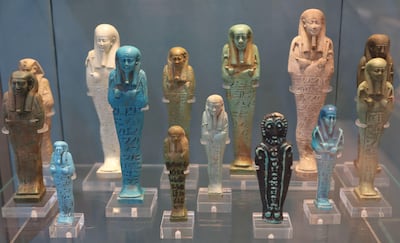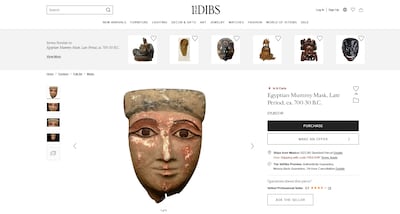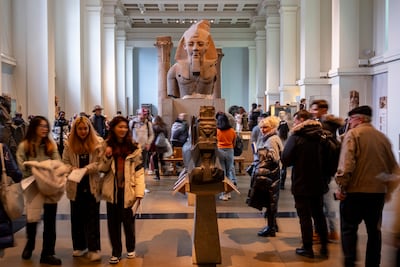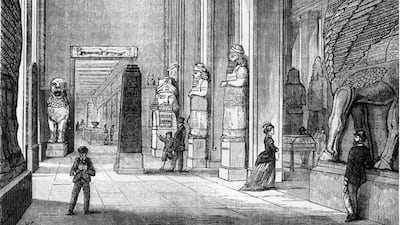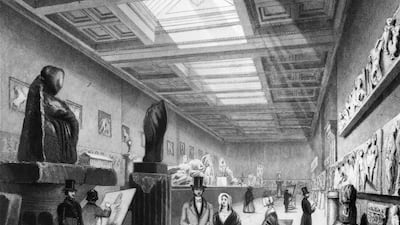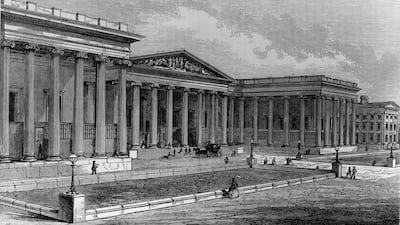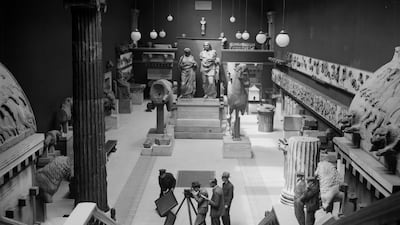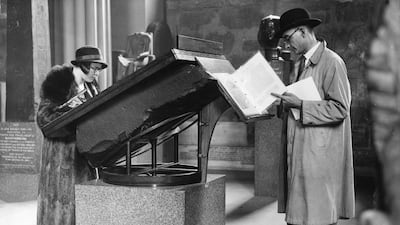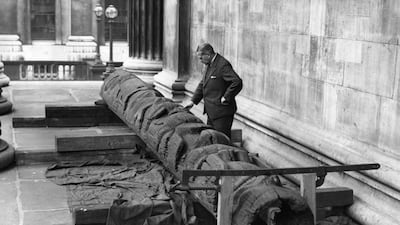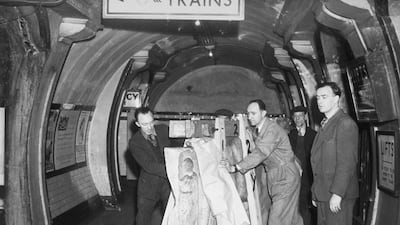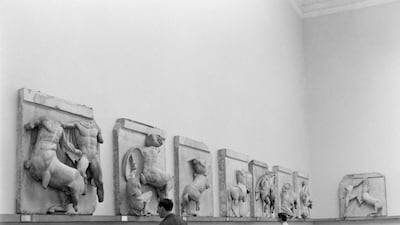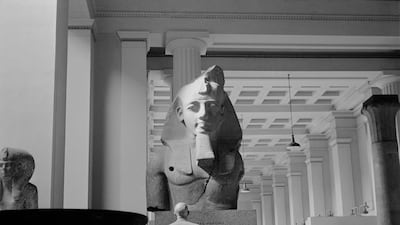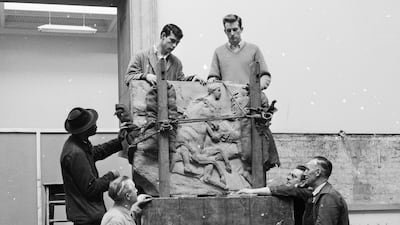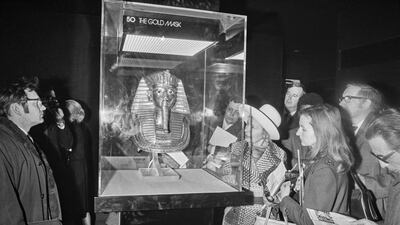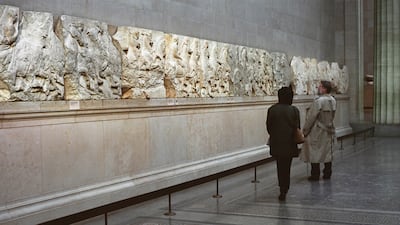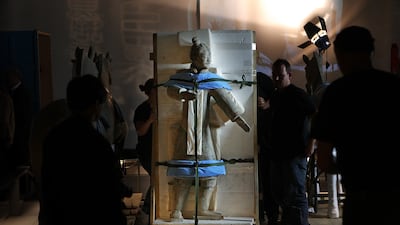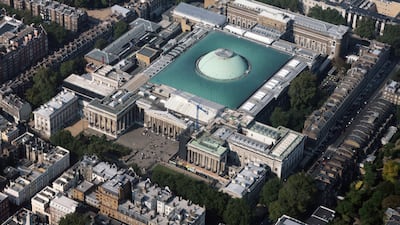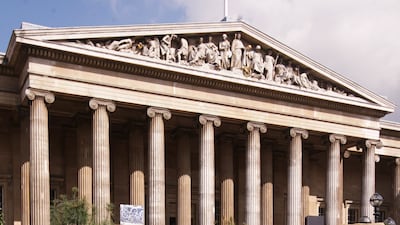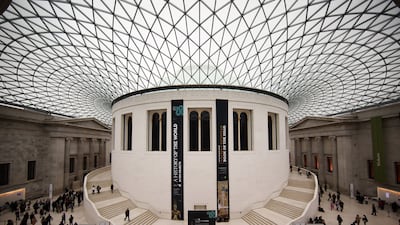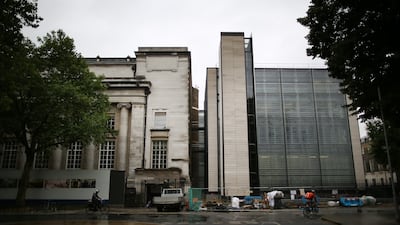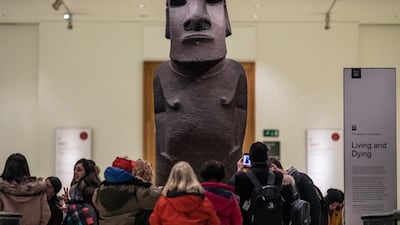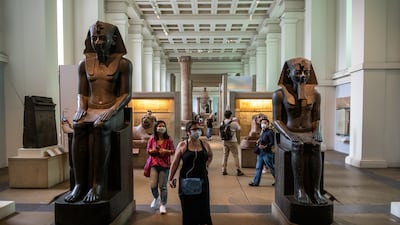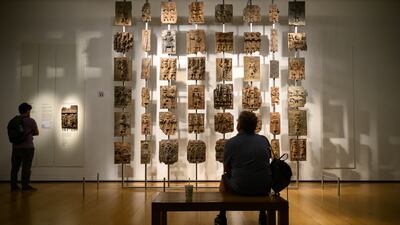Spread out on a table by US Homeland Security staff, the collection of 590 ancient Egyptian artefacts was a treasure trove of antiquities – including gold amulets, figurines and tablets.
Suspicious customs officers at New York’s JFK Airport had been met by the smell of wet earth the moment they undid the bubble-wrapped items. Sand and loose dirt spilt out, all "indicative of recent illicit excavation".
The passenger who brought them in suitcases from Cairo to the US, Ashraf Eldarir, insisted they were family heirlooms and he had paperwork in Arabic to prove his grandfather was an antiquities collector in the 1920s.
Eldarir's story failed to convince and he now faces up to 20 years in prison when he is sentenced in June, after admitting to four counts of smuggling. But his tactic, using fake provenance documents in the hope of convincing buyers that the items were discovered decades ago, set experts on the hunt for other relics that he may have sold.
An investigation by The National has uncovered that an artefact the British Museum bought from a convicted smuggler, as reported previously, was supposedly from the collection of Eldarir’s grandfather. It has led to questions over whether the institution had fallen for what one archaeologist dubbed the “dead dad provenance” trick, or “grandfathering”, as it is often known in the trade. The seemingly trivial purchase, for just $400, could prove embarrassing for the museum.
The smuggler
Eldarir had arrived at JFK in January 2020 with three suitcases, containing goods he valued at $300, when he was directed to a search area.
Officers found 41 gold artefacts among the bags, including amulets from a funerary set which prepared the deceased for the afterlife.
Also found was a cartouche of a Ptolemaic king on a relief that was originally part of a royal building or temple.
The largest single group of items found in Eldarir’s cases were 400 shabtis, or figurines.
“Anyone can fake an old document and use whatever names they want on them,” said Paul Barford, a British archaeologist who researches artefact hunting and the market for antiquities. “I’d take that with a huge pinch of salt unless there was independent evidence to support it.”
Shabti sale
The shabti, or figurine, now belonging to the British Museum is described as having “eyes with heavy lids and an unsmiling mouth” and a rare combination of attributes. The museum does not mention that it was bought from a convicted smuggler.
According to the ownership history on the museum’s website, the shabti was bought in Egypt in 1946 by Ezz el-Din Taha El Dharir, and then taken to the US two years later. Ezz el-Din is Ashraf Eldarir's grandfather and his name is more commonly transliterated as Ezeldeen Taha Eldarir.
The museum's website says that “in 1948, the two shabtis and many other Egyptian antiquities travelled from Cairo to Brooklyn, where they have remained within the family ever since".
The notes state it was sold in 2017 by “Dr Ashraf el-Dharir, a collector resident in Brooklyn”, using a different transliteration from Arabic of Eldarir’s name, to antiques dealer Morris Khouli, who runs the Palmyra Heritage Gallery in New York. In the latter half of that year, there were at least two Palmyra auctions featuring Egyptian antiquities from the “el-Dharir collection”.
Khouli is a convicted smuggler who also tried to use the dead dad trick when he offered a US collector two Egyptian antiquities he falsely said came from his father’s collection.
Regarding the shabti’s provenance, the museum's website states: “Morris Khouli of Palmyra has sent scans of a four-page Arabic document recording the family’s original purchase of 125 antiquities, including both shabtis, on 3 November 1946. The buyer, an ancestor of Ashraf, was Ezz el-Din Taha el-Dharir. The 1946 vendor is identified as a Salah el-Din Sirmali."
Khouli conviction
Khouli smuggled items into the US by making false declarations to customs about the country of origin and value of the items.
According to Immigration and Customs Enforcement, he provided “false provenances which stated that [two] Egyptian antiquities were part of a collection assembled by Khouli's father in Israel in the 1960s” when in fact “Khouli acquired the Egyptian antiquities from other dealers”.
He was sentenced to one year of probation, six months of home confinement and 200 hours of community service in 2012 after admitting buying and smuggling Egyptian antiquities, including coffins, funerary boats and limestone figures.
The museum adds that the item was authenticated at that time by an expert called Hussein Rashed, who is described as the head of a "House of Egyptian Antiquities".
Checkability
Mr Barford has been writing about both Eldarir and Khouli for a number of years. He questions why the museum has not looked at the original provenance documents.
"Where is the original of the document, what paper is it written on? Note that the museum only reports that ‘scans’ were ‘seen'," he said.
He is concerned that a provenance document can be easily concocted by a seller trying to account for how he came to obtain an item.
As well as fostering an image of legitimate purchase, the benefit of being able to say it belonged to a deceased relative allows sellers to get around rules introduced in recent decades to control the export of antiquities from Egypt, said Mr Barford.
He said the dealer is then in charge of the “checkability” of the information. “Unfortunately that person who had it earlier is almost always no longer around,” he said.
Angelika Hellweger, a lawyer and art crime expert, said: “What I find interesting is Eldarir seems to have used this statement that it was from a private collection because in 1983 Egypt introduced a prohibition on the export of antiquities without approval.”
Ms Hellweger, legal director at London's Rahman Ravelli law firm, added she "would not be surprised if Eldarir and Khouli, who are both collectors with a criminal past" had been in cahoots.
For sale
A number of other items said to come from the collection of Ezeldeen Taha Eldarir are currently or recently for sale.
Their provenance is described in near identical terms as the British Museum shabti: bought from Salahaddin Sirmali, "authenticated and appraised" by Hossen Rashed, then imported to the US in 1948.
- An Egyptian Mummy mask dating from 700BC-30BC, is on offer for £11,807 ($15,275) online by a seller in Mexico
- A coffin lid dating back to 664BC-332BC was offered for sale by a Colorado-based art dealer, with a starting price of $65,000
- A shabti that was on sale through a Chicago-based coin dealer, dating from 1567BC-1085BC, is up for $1,950
“Most buyers still do not ask any questions. They ask ‘is it real?’ and if something has a whiff of being illegally excavated, that is an additional argument for authenticity. It is as simple as that,” Mr Barford said.
He said the Unesco 1970 Convention, a treaty aimed at battling the illegal trade in cultural items, states that documentation accompanying artefacts should fulfil certain conditions. This followed a situation where for "years and years, antiquities were collected in a way that deliberately obscured where they actually came from".
"But dealers and collectors still refused to treat documenting origins with any seriousness and just chucked away receipts and shipping documents. Now we are beginning to take more notice and such ‘documents’ appear with dealers and collectors claiming they really had been curating them all this time. But how true is that?"
Museum in the spotlight
Chris Marinello, a leading expert in recovering stolen, looted and missing works of art, said items are often sold between dealers who already have probable customers lined up. Thorough questions are not always asked, he said, as “it’s a small community” and they “trust each other”.
He believes the British Museum should not have bought the shabti as the provenance was dubious. He suggested the museum should also tighten up their collection management procedures and security measures, pointing out that one of its curators was dismissed for gross misconduct in July last year after more than 1,800 items were found to be missing, stolen or damaged.
When The National contacted the British Museum about the shabti, it said the artefact has been the subject of a criminal investigation by the US authorities since 2019.
A request made under the UK’s freedom of information law to the museum to disclose the efforts it has made to establish the provenance of the shabti was rejected. It cited the exemption from disclosure due to the item being subject to law enforcement and legal proceedings.
The US Department of Homeland Security Investigations confirmed it has been conducting an inquiry but would not reveal any further details.
The museum says it is continuing to research the provenance of the object, is always willing to work with law enforcement and has engaged with US authorities to support inquiries.
“Establishing the provenance of an object is an integral part of the Museum’s acquisition process and this process undergoes regular review,” said a representative. "The most recent updates were in 2024 and ensure that the museum only acquires objects where it has undertaken satisfactory due diligence and made all reasonable enquiries.”
Mr Khouli has been approached for comment directly and Ashraf Omar Eldarir through his lawyer.
Rick St Hilaire, a cultural heritage lawyer, former chief prosecutor and past presidential appointee to the US Cultural Property Advisory Committee, points to the alarm bells that should ring for anyone checking the provenance of an artefact.
Mr St Hilaire said auction houses, major museums, owners, dealers and collectors must do due diligence.
“It starts with knowing the person you're dealing with. Second, listening to their story carefully. And it doesn't stop there. Get verifiable documents, photos and affidavits.
“Fake provenance is common, and the invention of tall tales is only limited by the imagination. In my experience, the bigger the tale, the more sceptical I am,” he told The National. "My rule is simple - if someone starts talking about their uncle’s dad’s brother’s stepson who found an object, I’m not buying it.”
The specs
Engine: 4.0-litre flat-six
Torque: 450Nm at 6,100rpm
Transmission: 7-speed PDK auto or 6-speed manual
Fuel economy, combined: 13.8L/100km
On sale: Available to order now
Courses%20at%20Istituto%20Marangoni%2C%20Dubai
%3Cp%3E%3Cstrong%3EUndergraduate%20courses%3C%2Fstrong%3E%3Cbr%3EInterior%20Design%3B%20Product%20Design%3B%20Visual%20Design%3B%20Fashion%20Design%20%26amp%3B%20Accessories%3B%20Fashion%20Styling%20%26amp%3B%20Creative%20Direction%3B%20Fashion%20Business%3B%20Foundation%20in%20Fashion%3B%20Foundation%20in%20Design%3Cbr%3E%3Cstrong%3EProfessional%20courses%3C%2Fstrong%3E%3Cbr%3EFashion%20e-Commerce%20%26amp%3B%20Digital%20Marketing%3B%20Fashion%20Entrepreneurship%3B%20Fashion%20Luxury%20Retail%20and%20Visual%20Merchandising%3Cbr%3E%3Cstrong%3EShort%20courses%3C%2Fstrong%3E%3Cbr%3EFashion%20design%3B%20Fashion%20Image%20%26amp%3B%20Styling%3B%20Fashion%20Trend%20Forecasting%3B%20Interior%20Design%3B%20Digital%20Art%20in%20Fashion%3Cbr%3EMore%20information%20is%20at%20%3Ca%20href%3D%22https%3A%2F%2Fwww.istitutomarangoni.com%2Fen%3Futm_source%3DLocal%26utm_medium%3Dorganic%26utm_campaign%3Dgmb%26utm_content%3Ddubai%22%20target%3D%22_self%22%3Ewww.istitutomarangoni.com%3C%2Fa%3E%3C%2Fp%3E%0A
Killing of Qassem Suleimani
Specs
Engine: Electric motor generating 54.2kWh (Cooper SE and Aceman SE), 64.6kW (Countryman All4 SE)
Power: 218hp (Cooper and Aceman), 313hp (Countryman)
Torque: 330Nm (Cooper and Aceman), 494Nm (Countryman)
On sale: Now
Price: From Dh158,000 (Cooper), Dh168,000 (Aceman), Dh190,000 (Countryman)
F1 The Movie
Starring: Brad Pitt, Damson Idris, Kerry Condon, Javier Bardem
Director: Joseph Kosinski
Rating: 4/5
GROUPS AND FIXTURES
Group A
UAE, Italy, Japan, Spain
Group B
Egypt, Iran, Mexico, Russia
Tuesday
4.15pm: Italy v Japan
5.30pm: Spain v UAE
6.45pm: Egypt v Russia
8pm: Iran v Mexico
Citadel: Honey Bunny first episode
Directors: Raj & DK
Stars: Varun Dhawan, Samantha Ruth Prabhu, Kashvi Majmundar, Kay Kay Menon
Rating: 4/5
MATCH INFO
Crawley Town 3 (Tsaroulla 50', Nadesan 53', Tunnicliffe 70')
Leeds United 0
Our family matters legal consultant
Name: Hassan Mohsen Elhais
Position: legal consultant with Al Rowaad Advocates and Legal Consultants.
David Haye record
Total fights: 32
Wins: 28
Wins by KO: 26
Losses: 4
The specs: McLaren 600LT
Price, base: Dh914,000
Engine: 3.8-litre twin-turbo V8
Transmission: Seven-speed automatic
Power: 600hp @ 7,500rpm
Torque: 620Nm @ 5,500rpm
Fuel economy 12.2.L / 100km
Gothia Cup 2025
4,872 matches
1,942 teams
116 pitches
76 nations
26 UAE teams
15 Lebanese teams
2 Kuwaiti teams
Global Fungi Facts
• Scientists estimate there could be as many as 3 million fungal species globally
• Only about 160,000 have been officially described leaving around 90% undiscovered
• Fungi account for roughly 90% of Earth's unknown biodiversity
• Forest fungi help tackle climate change, absorbing up to 36% of global fossil fuel emissions annually and storing around 5 billion tonnes of carbon in the planet's topsoil
UAE currency: the story behind the money in your pockets
How has net migration to UK changed?
The figure was broadly flat immediately before the Covid-19 pandemic, standing at 216,000 in the year to June 2018 and 224,000 in the year to June 2019.
It then dropped to an estimated 111,000 in the year to June 2020 when restrictions introduced during the pandemic limited travel and movement.
The total rose to 254,000 in the year to June 2021, followed by steep jumps to 634,000 in the year to June 2022 and 906,000 in the year to June 2023.
The latest available figure of 728,000 for the 12 months to June 2024 suggests levels are starting to decrease.
THE BIO
Favourite book: ‘Purpose Driven Life’ by Rick Warren
Favourite travel destination: Switzerland
Hobbies: Travelling and following motivational speeches and speakers
Favourite place in UAE: Dubai Museum
Scoreline
Syria 1-1 Australia
Syria Al Somah 85'
Australia Kruse 40'
Total eligible population
About 57.5 million people
51.1 million received a jab
6.4 million have not
Where are the unvaccinated?
England 11%
Scotland 9%
Wales 10%
Northern Ireland 14%
The%20specs
%3Cp%3E%3Cstrong%3EEngine%3A%20%3C%2Fstrong%3E3.6-litre%2C%20V6%0D%3Cbr%3E%3Cstrong%3ETransmission%3A%20%3C%2Fstrong%3Eeight-speed%20auto%0D%3Cbr%3E%3Cstrong%3EPower%3A%20%3C%2Fstrong%3E285hp%0D%3Cbr%3E%3Cstrong%3ETorque%3A%20%3C%2Fstrong%3E353Nm%0D%3Cbr%3E%3Cstrong%3EPrice%3A%20%3C%2Fstrong%3EDh159%2C900%0D%3Cbr%3E%3Cstrong%3EOn%20sale%3A%20%3C%2Fstrong%3Enow%3C%2Fp%3E%0A
FA%20Cup%20semi-final%20draw
%3Cp%3ECoventry%20City%20v%20Manchester%20United%C2%A0%3C%2Fp%3E%0A%3Cp%3EManchester%20City%20v%20Chelsea%3C%2Fp%3E%0A%3Cp%3E-%20Games%20to%20be%20played%20at%20Wembley%20Stadium%20on%20weekend%20of%20April%2020%2F21.%C2%A0%3C%2Fp%3E%0A
UAE currency: the story behind the money in your pockets
How Islam's view of posthumous transplant surgery changed
Transplants from the deceased have been carried out in hospitals across the globe for decades, but in some countries in the Middle East, including the UAE, the practise was banned until relatively recently.
Opinion has been divided as to whether organ donations from a deceased person is permissible in Islam.
The body is viewed as sacred, during and after death, thus prohibiting cremation and tattoos.
One school of thought viewed the removal of organs after death as equally impermissible.
That view has largely changed, and among scholars and indeed many in society, to be seen as permissible to save another life.
SPECS
%3Cp%3E%0D%3Cstrong%3EEngine%3A%3C%2Fstrong%3E%204.0-litre%20twin-turbo%20V8%0D%3Cbr%3E%3Cstrong%3EPower%3A%3C%2Fstrong%3E%20750hp%20at%207%2C500rpm%0D%3Cbr%3E%3Cstrong%3ETorque%3A%3C%2Fstrong%3E%20800Nm%20at%205%2C500rpm%0D%3Cbr%3E%3Cstrong%3ETransmission%3A%3C%2Fstrong%3E%207%20Speed%20dual-clutch%20auto%0D%0D%3Cbr%3E%3Cstrong%3ETop%20speed%3A%3C%2Fstrong%3E%20332kph%0D%3Cbr%3E%3Cstrong%3EFuel%20consumption%3A%3C%2Fstrong%3E%2012.2L%2F100km%0D%3Cbr%3E%3Cstrong%3EOn%20sale%3A%20%3C%2Fstrong%3EYear%20end%0D%3Cbr%3E%3Cstrong%3EPrice%3A%3C%2Fstrong%3E%20From%20Dh1%2C430%2C000%20(coupe)%3B%20From%20Dh1%2C566%2C000%20(Spider)%3C%2Fp%3E%0A
Lexus LX700h specs
Engine: 3.4-litre twin-turbo V6 plus supplementary electric motor
Power: 464hp at 5,200rpm
Torque: 790Nm from 2,000-3,600rpm
Transmission: 10-speed auto
Fuel consumption: 11.7L/100km
On sale: Now
Price: From Dh590,000
Copa del Rey
Barcelona v Real Madrid
Semi-final, first leg
Wednesday (midnight UAE)
Nepotism is the name of the game
Salman Khan’s father, Salim Khan, is one of Bollywood’s most legendary screenwriters. Through his partnership with co-writer Javed Akhtar, Salim is credited with having paved the path for the Indian film industry’s blockbuster format in the 1970s. Something his son now rules the roost of. More importantly, the Salim-Javed duo also created the persona of the “angry young man” for Bollywood megastar Amitabh Bachchan in the 1970s, reflecting the angst of the average Indian. In choosing to be the ordinary man’s “hero” as opposed to a thespian in new Bollywood, Salman Khan remains tightly linked to his father’s oeuvre. Thanks dad.
MATCH INFO
Cricket World Cup League Two
Oman, UAE, Namibia
Al Amerat, Muscat
Results
Oman beat UAE by five wickets
UAE beat Namibia by eight runs
Namibia beat Oman by 52 runs
UAE beat Namibia by eight wickets
UAE v Oman - abandoned
Oman v Namibia - abandoned
The smuggler
Eldarir had arrived at JFK in January 2020 with three suitcases, containing goods he valued at $300, when he was directed to a search area.
Officers found 41 gold artefacts among the bags, including amulets from a funerary set which prepared the deceased for the afterlife.
Also found was a cartouche of a Ptolemaic king on a relief that was originally part of a royal building or temple.
The largest single group of items found in Eldarir’s cases were 400 shabtis, or figurines.
Khouli conviction
Khouli smuggled items into the US by making false declarations to customs about the country of origin and value of the items.
According to Immigration and Customs Enforcement, he provided “false provenances which stated that [two] Egyptian antiquities were part of a collection assembled by Khouli's father in Israel in the 1960s” when in fact “Khouli acquired the Egyptian antiquities from other dealers”.
He was sentenced to one year of probation, six months of home confinement and 200 hours of community service in 2012 after admitting buying and smuggling Egyptian antiquities, including coffins, funerary boats and limestone figures.
For sale
A number of other items said to come from the collection of Ezeldeen Taha Eldarir are currently or recently for sale.
Their provenance is described in near identical terms as the British Museum shabti: bought from Salahaddin Sirmali, "authenticated and appraised" by Hossen Rashed, then imported to the US in 1948.
- An Egyptian Mummy mask dating from 700BC-30BC, is on offer for £11,807 ($15,275) online by a seller in Mexico
- A coffin lid dating back to 664BC-332BC was offered for sale by a Colorado-based art dealer, with a starting price of $65,000
- A shabti that was on sale through a Chicago-based coin dealer, dating from 1567BC-1085BC, is up for $1,950
